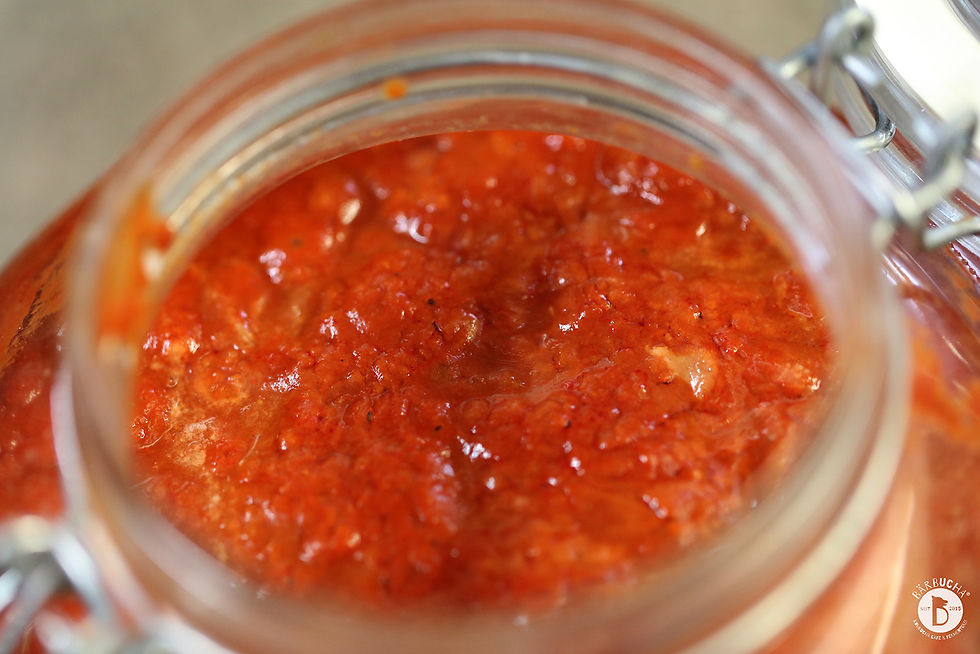Ketchup is one of the best known condiments, but it can come with a surprise.
Sometimes, with more than just one.

The first surprise is usually the amount of sugar that a bottle of Ketchup can contain.
And it usually goes like this: the more unripe tomatoes that are mixed into a tomato paste, the more sugar must be used to balance the sourness.
So some Ketchup(s) can contain quite a lot of sugar.
A table spoon of Heinz Ketchup contains about 4 gr of sugar, which is more than an average Chocolate chip cookie (see here).
But it can get worse. It might not even be sugar, that was used, but some other sweet substance like, a high fructose corn syrup, which is made from a GMO corn.
So sugar is one problem.
The second problem could be the tomatoes. Depending where they come from and whether they are organic or not, they (meaning the already made tomato paste) can contain up to 25% of corn starch, which will not even be listed in the ingredient list.
One of the reasons for that is the fact that China became one of the largest producers of tomato paste and what goes on over there with how some of the products are produced, is largely unregulated.
Then, those products are distributed throughout Europe and the US as Italian tomatoes.
One more problem is also caused by the fact that most of the tomato paste or tomatoes that are later used as a material for tomato sauce, come in cans.
And here's why:
"The problem: The resin linings of tin cans contain bisphenol-A, a synthetic estrogen that has been linked to ailments ranging from reproductive problems to heart disease, diabetes, and obesity. Unfortunately, acidity (a prominent characteristic of tomatoes) causes BPA to leach into your food." (for more see here)
Knowing all that we know, we avoid the commercially made Ketchup and we've been making our own, fermented version for quite some time.
Only just recently, after numerous requests, we have decided to offer it to our customers.
When we make it, we pick BIO tomatoes that come in glass and we check the country of origin. This gives us, at least some assurance, that the product does not come from China and that we do not get some extra unwanted things with it.
Ketchup can be quite delicious, especially if it's made right.
We love it and that is why we also make our own Fermented Ketchup.
Here are all the ingredients that go into making it.

When we make it, we start with onions and garlic. Those we brown off a bit in olive oil.

When they are done. We puree them and we add them to the tomato mix, along with sugar, salt and spices.

We mix all the ingredients, and we bring the whole mixture to a light simmer.

When that cools down, we add our live and delicious Kombucha Vinegar.

Kombucha Vinegar kick starts the fermentation process and that makes our Ketchup few notches better than most of the readily available Ketchup.
When the fermentation process is started, most of the added sugar is broken down. As a result, our Ketchup has some natural sour notes, making it pleasantly sweet and sour.
So next, our Ketchup goes into our Fermentation Jar, so that the fermentation process can proceed.

After few days, we start seeing the fermentation bubbles.

The length of the fermentation process depends on the overall room temperature. It can be from few days to over a week. But even when our Ketchup jars go into the fridge, the fermentation process will continue.
Below is a pic of fully Fermented Ketchup, just before it goes into our retail jars.


And now, it is ready for retail.

We love our Ketchup, and when we have a sandwich that calls for it, we obviously are very happy to use it.
Here are just two examples:

A Lentil Burger with Lettuce, Tomatoes, Fermented Ketchup and Lacto-fermented Onions.

Tempeh Sandwich with Avocado, Lettuce, Tomato, Kombucha Mustard, Fermented Ketchup and our Garlic Dill Pickle.
Ingredients: Tomatoes, Kombucha Vinegar, Unrefined BIO Sugar, Onion, Garlic, and Spices (Smoked Paprika, Cumin, and Coriander)

Kommentare